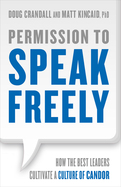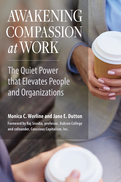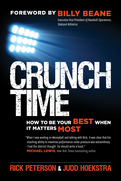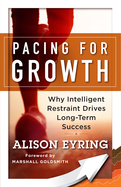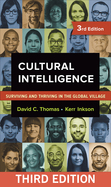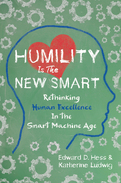Search Results: ""
Results 817-822 of 1358
Lead So Your People Speak Freely
Candid communication enhances innovation, ownership, engagement, and performance. The benefits of hearing questions and uncertainties, good and bad ideas, and honest feedback are game-changing. Yet research shows that most of the time, people never share their true thoughts with each other—and especially not with their leaders.
But what if they did? What if everyone could confidently communicate without fearing a negative response? In Permission to Speak Freely, highly acclaimed leader developers Doug Crandall and Matt Kincaid illustrate the benefits of candor, explain the inhibitors that cause it to feel unsafe, and provide tools for leaders to encourage their people and embed trust and openness into the foundation of their organizational culture.
Candid communication enhances innovation, ownership, engagement, and performance. The benefits of hearing questions and uncertainties, good and bad ideas, and honest feedback are game-changing. Yet research shows that most of the time, people never share their true thoughts with each other—and especially not with their leaders.
But what if they did? What if everyone could confidently communicate without fearing a negative response? In Permission to Speak Freely, highly acclaimed leader developers Doug Crandall and Matt Kincaid illustrate the benefits of candor, explain the inhibitors that cause it to feel unsafe, and provide tools for leaders to encourage their people and embed trust and openness into the foundation of their organizational culture.
Caring Is a Competitive Advantage
Suffering in the workplace can rob our colleagues and coworkers of humanity, dignity, and motivation and is an unrecognized and costly drain on organizational potential. Marshaling evidence from two decades of field research, scholars and consultants Monica Worline and Jane Dutton show that alleviating such suffering confers measurable competitive advantages in areas like innovation, collaboration, service quality, and talent attraction and retention. They outline four steps for meeting suffering with compassion and show how to build a capacity for compassion into the structures and practices of an organization—because ultimately, as they write, “Compassion is an irreplaceable dimension of excellence for any organization that wants to make the most of its human capabilities.”
Suffering in the workplace can rob our colleagues and coworkers of humanity, dignity, and motivation and is an unrecognized and costly drain on organizational potential. Marshaling evidence from two decades of field research, scholars and consultants Monica Worline and Jane Dutton show that alleviating such suffering confers measurable competitive advantages in areas like innovation, collaboration, service quality, and talent attraction and retention. They outline four steps for meeting suffering with compassion and show how to build a capacity for compassion into the structures and practices of an organization—because ultimately, as they write, “Compassion is an irreplaceable dimension of excellence for any organization that wants to make the most of its human capabilities.”
Crunch Time
2017
Be Your Best Under Pressure!
Learn how elite athletes like Michael Jordan, Sandy Cofax, Tom Glavin, and Pedro Martinez, deal with pressure. In his 15 years as a major league pitching coach, with "Moneyball" Oakland A's, NY Mets, Milwaukee Brewers and Baltimore Orioles, Rick Peterson has coached Hall of Famers, Cy Young winners, and many other elite athletes. In this book, he and bestselling author and leadership expert, Judd Hoekstra make this skill available to everyone. From an insider's perspective, learn how you too can become a Crunch Time performer and perform your best in all situations. With fascinating behind-the-scenes examples from some of the top names in sports and business, Rick and Judd offer six powerful reframing strategies to help you see a pressure situation with a new perspective so that it shifts from a threat that can make you panic to an opportunity for you to shine. With a Forward by "Money Ball”, Billy Beane, EVP, Oakland Athletics.
Learn how elite athletes like Michael Jordan, Sandy Cofax, Tom Glavin, and Pedro Martinez, deal with pressure. In his 15 years as a major league pitching coach, with "Moneyball" Oakland A's, NY Mets, Milwaukee Brewers and Baltimore Orioles, Rick Peterson has coached Hall of Famers, Cy Young winners, and many other elite athletes. In this book, he and bestselling author and leadership expert, Judd Hoekstra make this skill available to everyone. From an insider's perspective, learn how you too can become a Crunch Time performer and perform your best in all situations. With fascinating behind-the-scenes examples from some of the top names in sports and business, Rick and Judd offer six powerful reframing strategies to help you see a pressure situation with a new perspective so that it shifts from a threat that can make you panic to an opportunity for you to shine. With a Forward by "Money Ball”, Billy Beane, EVP, Oakland Athletics.
Pacing for Growth
2017
Go the Distance!
Whether you're running a race or running a company, pacing is everything. Go too fast and you'll burn yourself out—too slow and you're left in the dust. So how can leaders find the right speed? Growth expert Alison Eyring, who is also a long-distance runner and triathlete, found the answer in endurance training.
It's a concept she calls Intelligent Restraint. Eyring shows leaders how to evaluate their company's and team's current capacity for growth and identify the right capabilities and pacing strategies to increase growth steadily and sustainably. She masterfully weaves physiological and psychological research, in-depth business case studies, examples from real leaders, and practical tools with her own narrative of endurance training. The result is a revolutionary new mindset for enduring success.
Whether you're running a race or running a company, pacing is everything. Go too fast and you'll burn yourself out—too slow and you're left in the dust. So how can leaders find the right speed? Growth expert Alison Eyring, who is also a long-distance runner and triathlete, found the answer in endurance training.
It's a concept she calls Intelligent Restraint. Eyring shows leaders how to evaluate their company's and team's current capacity for growth and identify the right capabilities and pacing strategies to increase growth steadily and sustainably. She masterfully weaves physiological and psychological research, in-depth business case studies, examples from real leaders, and practical tools with her own narrative of endurance training. The result is a revolutionary new mindset for enduring success.
Succeed in Any Culture, in Every Situation
In today's global economy, the ability to interact effectively across cultures is a fundamental job requirement for just about everyone. But it's impossible to learn the customs and traits of every single culture. David Thomas and Kerr Inkson present a universal set of techniques and people skills that will allow you to adapt quickly to, and thrive in, any cultural environment. You'll learn to discard your own culturally based assumptions and pay careful attention, in a mindful and creative way, to cues in cross-cultural situations. The authors show how to apply cultural intelligence in a series of specific situations: making decisions; communicating, negotiating, and resolving conflicts; leading and motivating others; and designing, managing, and contributing to multicultural groups and teams.
This extensively revised third edition has been updated with new stories showing cultural intelligence in action. Thomas and Inkson have broadened the focus beyond business to include organizations of all kinds—nonprofits, governments, educational institutions, and more. And they include a reliable and valid measure of cultural intelligence based on a decade of research by an international team of scholars.
In today's global economy, the ability to interact effectively across cultures is a fundamental job requirement for just about everyone. But it's impossible to learn the customs and traits of every single culture. David Thomas and Kerr Inkson present a universal set of techniques and people skills that will allow you to adapt quickly to, and thrive in, any cultural environment. You'll learn to discard your own culturally based assumptions and pay careful attention, in a mindful and creative way, to cues in cross-cultural situations. The authors show how to apply cultural intelligence in a series of specific situations: making decisions; communicating, negotiating, and resolving conflicts; leading and motivating others; and designing, managing, and contributing to multicultural groups and teams.
This extensively revised third edition has been updated with new stories showing cultural intelligence in action. Thomas and Inkson have broadened the focus beyond business to include organizations of all kinds—nonprofits, governments, educational institutions, and more. And they include a reliable and valid measure of cultural intelligence based on a decade of research by an international team of scholars.
Smart machines are replacing more and more jobs. Edward Hess and Katherine Ludwig show how to develop abilities that machines don't have so we can thrive in this Smart Machine Age. Underlying them all is a sense of personal humility: honestly recognizing our limitations and working to mitigate them.
Smart machines are replacing more and more jobs. Edward Hess and Katherine Ludwig show how to develop abilities that machines don't have so we can thrive in this Smart Machine Age. Underlying them all is a sense of personal humility: honestly recognizing our limitations and working to mitigate them.
In nearly every industry, smart machines are replacing human labor. It's not just factory jobs-automated technologies are handling people's investments, diagnosing illnesses, and analyzing written documents. If we humans are going to endure, Edward Hess and Katherine Ludwig say we're going to need a dose of humility.
We need to be humble enough to let go of the idea that smart means knowing the most, using that information quickest, and making the fewest mistakes. Smart machines will always be better than we are at those things. Instead, we need to cultivate important abilities that smart machines don't have (yet): thinking critically, creatively, and innovatively and building close relationships with others so we can collaborate effectively. Hess and Ludwig call this being NewSmart.
To develop these abilities, we need to practice four specific behaviors: keeping our egos out of our way, managing our thoughts and emotions to curb any biases or defensiveness, listening to others with an open mind, and connecting with others socially and emotionally. What all these behaviors have in common is, again, humility-avoiding self-centeredness so we can learn from and work with other humans. Hess and Ludwig offer a guide to developing these NewSmart abilities and to creating organizations where these qualities are encouraged and rewarded.
Smart machines are replacing more and more jobs. Edward Hess and Katherine Ludwig show how to develop abilities that machines don't have so we can thrive in this Smart Machine Age. Underlying them all is a sense of personal humility: honestly recognizing our limitations and working to mitigate them.
In nearly every industry, smart machines are replacing human labor. It's not just factory jobs-automated technologies are handling people's investments, diagnosing illnesses, and analyzing written documents. If we humans are going to endure, Edward Hess and Katherine Ludwig say we're going to need a dose of humility.
We need to be humble enough to let go of the idea that smart means knowing the most, using that information quickest, and making the fewest mistakes. Smart machines will always be better than we are at those things. Instead, we need to cultivate important abilities that smart machines don't have (yet): thinking critically, creatively, and innovatively and building close relationships with others so we can collaborate effectively. Hess and Ludwig call this being NewSmart.
To develop these abilities, we need to practice four specific behaviors: keeping our egos out of our way, managing our thoughts and emotions to curb any biases or defensiveness, listening to others with an open mind, and connecting with others socially and emotionally. What all these behaviors have in common is, again, humility-avoiding self-centeredness so we can learn from and work with other humans. Hess and Ludwig offer a guide to developing these NewSmart abilities and to creating organizations where these qualities are encouraged and rewarded.


